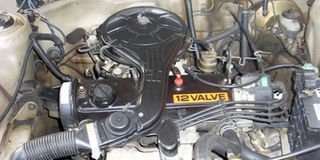My car has a recurring engine problem, please advise

What you need to know:
- Going forward you need a mechanic who can carry out a compression test (using compression kit) which will confirm my remote symptomatic diagnosis, inspect the lower engine sump to confirm presence of sludge and clogging of the oil pick up tube.
- This inspection will determine whether engine has upper or lower component damage. This will be the basis of deciding whether it’s worth rebuilding the engine (with genuine new parts) or out rightly replace with a quality used one. Mark
Hi Paul, I enjoy reading your articles. My 1.3CC petrol Toyota Corsa 1997,E-EL51 produces a tapping sound when I start it in the morning. The sound reduces when the dashboard oil goes off. My mechanic told me the engine pump was faulty and needed replacement. We replaced it but the sound is still there.
I have been told that the sound stops after the oil has circulated around the engine. However, my mechanic now says the engine might be having a problem. I have always topped up engine oil and replaced oil seals to avoid leakage but my oil levels keep dropping. The mechanic is now recommending an engine overhaul, which will set me back by about Shs1m. I have also consulted other mechanics who quote different prices as well as offering different advice. What could be your diagnosis and remedy?
Hello Mark, your engine may have multiple lubrication issues. Despite replacing the oil pump, your engine still has slow oil pressure build up, seems to burn engine oil, may have mechanical damage of valve train components (upper engine) or lower engine components (piston rings) which may explain low oil pressure, persistent valve tapping or piston slap noise, continued loss or burning of engine oil as well as the dark soot in the exhaust.
The possible causes of slow oil pressure build up as manifested by the subsiding engine tapping noise, include the oil pump, dirty engine oil passages clogged with sludge (thick residue from aged or poor quality oil), a clogged engine oil pick up strainer near the engine sump - usually blocked by thick sludge or a damaged sump.
The engine loss of climbing power is most likely a result of low engine compression. Compressing the fuel mixture in a cylinder of an internal combustion engine is a critical role of the piston during the combustion (fuel burning) cycle. When your engine piston rings are damaged they will leak engine oil into the combustion chamber as well as lose compression (leak pressure of air fuel mixture) which will reduce engine performance.
Going forward you need a mechanic who can carry out a compression test (using compression kit) which will confirm my remote symptomatic diagnosis, inspect the lower engine sump to confirm presence of sludge and clogging of the oil pick up tube.
This inspection will determine whether engine has upper or lower component damage. This will be the basis of deciding whether it’s worth rebuilding the engine (with genuine new parts) or out rightly replace with a quality used one. Mark




